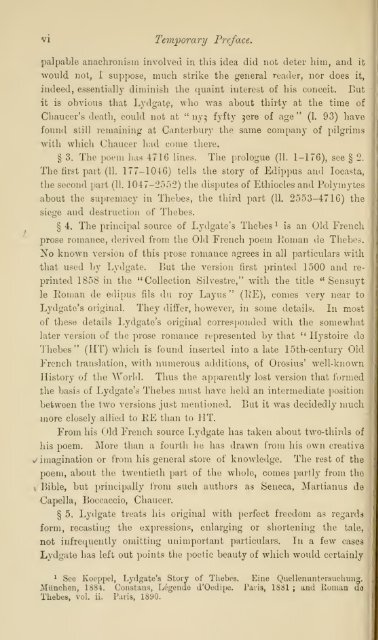You also want an ePaper? Increase the reach of your titles
YUMPU automatically turns print PDFs into web optimized ePapers that Google loves.
viTemporary Preface.palpable anachronism involved in this idea did not deter him, and itwould not, I suppose, much strike the general reader, nor does it,indeed, essentially diminish the quaint interest <strong>of</strong> his conceit. Cutit is obvious that Lydgatp, who was about thirty at the time <strong>of</strong>Cliaucer's death, could not at " ny^ fyfty ^ere <strong>of</strong> age " (1. 93) havefound still remaining at Canterbury the same company <strong>of</strong> pilgrimswith which Cliaucer had come there.§ 3. The potMii lias 4716 lines. The i)rologue (11. 1-176), see § 2.The first part (11. 177-10-46) tells the story <strong>of</strong> Edippus and locasta,the second part (11. 1047-25.'i2) the disputes <strong>of</strong> Ethiocles and Polymytesabout the supremacy in <strong>Thebes</strong>, the third part (11. 2553-4716) thesiege and destruction <strong>of</strong> <strong>Thebes</strong>.§ 4. The principal source <strong>of</strong> <strong>Lydgate's</strong> <strong>Thebes</strong> ^ is an Old Frenchprose romance, derived from the Old French poem Koman de <strong>Thebes</strong>.No known version <strong>of</strong> this prose romance agrees in all particulars withthat used by Lydgate. But the version first printed 1500 and reprinted1858 in the "Collection Silvestre," with the title *' Sensuytle Itoman de edipus fils du roy Layus " (KE), comes very near to<strong>Lydgate's</strong> original. They differ, however, in some details. In most<strong>of</strong> these details <strong>Lydgate's</strong> original corresponded with the somewhatlater version <strong>of</strong> the prose romance represented by that " ITystoire de<strong>Thebes</strong>" (HT) which is found inserted into a late 15th-centLiry OldFrench translation, with numerous additions, <strong>of</strong> Orosius' well-knownHistory <strong>of</strong> the AVorld. Thus the apj^arently lost version that formedthe basis <strong>of</strong> <strong>Lydgate's</strong> <strong>Thebes</strong> must have held an intermediate positionbetween the two versions just mentioned. But it was decidedly muchmore closely allied to RE than to IIT.From his Old French source Lydgate has taken about two-thirds <strong>of</strong>his poem. ]\Iore than a fourth he has drawn from his own creative»/ imagination or from his general store <strong>of</strong> knowledge. The rest <strong>of</strong> thepoem, about the twentieth part <strong>of</strong> the whole, comes partly from theV Bible, but principally i'rom such authors as Seneca, ]Martianus deCapella, Boccaccio, Chaucer.§ 5. Lydgate treats his original with perfect freedom as regardsform, recasting the expressions, enlarging or shortening the tale,not infrequently omitting unimportant particulars. In a few casesLydgate ha3 left out points the poetic beauty <strong>of</strong> which would certainlyI^ See Koeppel, <strong>Lydgate's</strong> Story <strong>of</strong> Tiiebos. Eine Quellenuntersueliuno;.JMunchen, 1884. Constans, Legende d'Oedipe. Paiia, 18S1 ; aud Koiiiaa do<strong>Thebes</strong>, vol. ii. Paris, 1890.

















